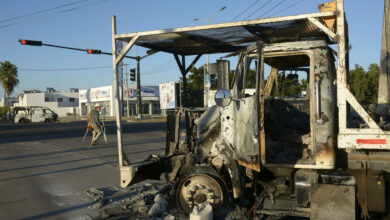Priest fasts to protest conviction of Argentina’s Cristina Fernandez

By Javier Castro Bugarin
Buenos Aires, Mar 29 (EFE).- A Spanish-born Argentine priest has spent the last five days on hunger strike outside the South American nation’s Supreme Court to denounce the conviction on corruption charges that threatens to bar Vice President Cristina Fernandez from public office for the rest of her life.
The high court is a “rotten institution” that aims to sideline the former president, the Rev. Francisco Olveira tells EFE at his encampment on Plaza de Tribunales in Buenos Aires.
“There is a popular clamor that we have to overcome the proscription,” the 58-year-old priest says, adding that whether or not Fernandez wants to run for president in this year’s election, the court “cannot take the most important political leader in Argentina off the board.”
Fernandez, 70, was convicted on Dec. 6 for improprieties in the awarding of public works contracts during the 2003-2007 presidency of her late husband, Nestor Kirchner, and her own 2007-2015 tenure as head of state.
Besides a prison term that she would serve under house arrest due to her age, the sentence included a lifetime ban on public office.
The day the verdict was announced, Fernandez said that she would not seek any office in 2024 and described herself as a victim of persecution by her political enemies in the judiciary and the media.
Olveira, who says that he came to Argentina in 1987 with the intention “to live with the poorest,” resides in a slum on the outskirts of Buenos Aires, where he strives “to improve the living conditions” of vulnerable people.
Last Friday, he and other priests joined a march marking the anniversary of the March 24, 1976, coup that led to seven years of rule by a corrupt military junta that killed 30,000 people and subjected tens of thousands to torture and arbitrary imprisonment.
“The fast is a continuation of March 24. A group of young people urged that this (March) 24 we had to go to (Plaza de) Tribunales,” Olveira says. “Here we began the hunger strike to keep it going.”
Nine other people, including priests, human rights activists and veterans of the 1982 Falklands War, are fasting along with Olveira in Buenos Aires.
Olveira says that Argentine prosecutors and courts are engaged in lawfare: the use of the law and judiciary to damage or delegitimize an opponent.
The same strategy has been deployed in other Latin American countries, notably Brazil, to demonize popular leaders who, “with their virtues and their defects … improve the lives of the people,” the priest says.
“If Cristina runs, what will the right say? They will say that she is running so as not to go to jail, because if she runs she has immunity and so they can’t jail her. And that is the very reason that she says, for now, that she will not run,” he says.
An optimist by nature, Olveira says he firmly believes that the hunger strike will contribute to overturning the proscription of Fernandez and to undermining the legitimacy of the Supreme Court.
“That’s why we say that we are fasting for the impoverished, for the resignation of the Supreme Court, and against this judicial mafia that governs us,” the priest says. EFE jacb/dr





